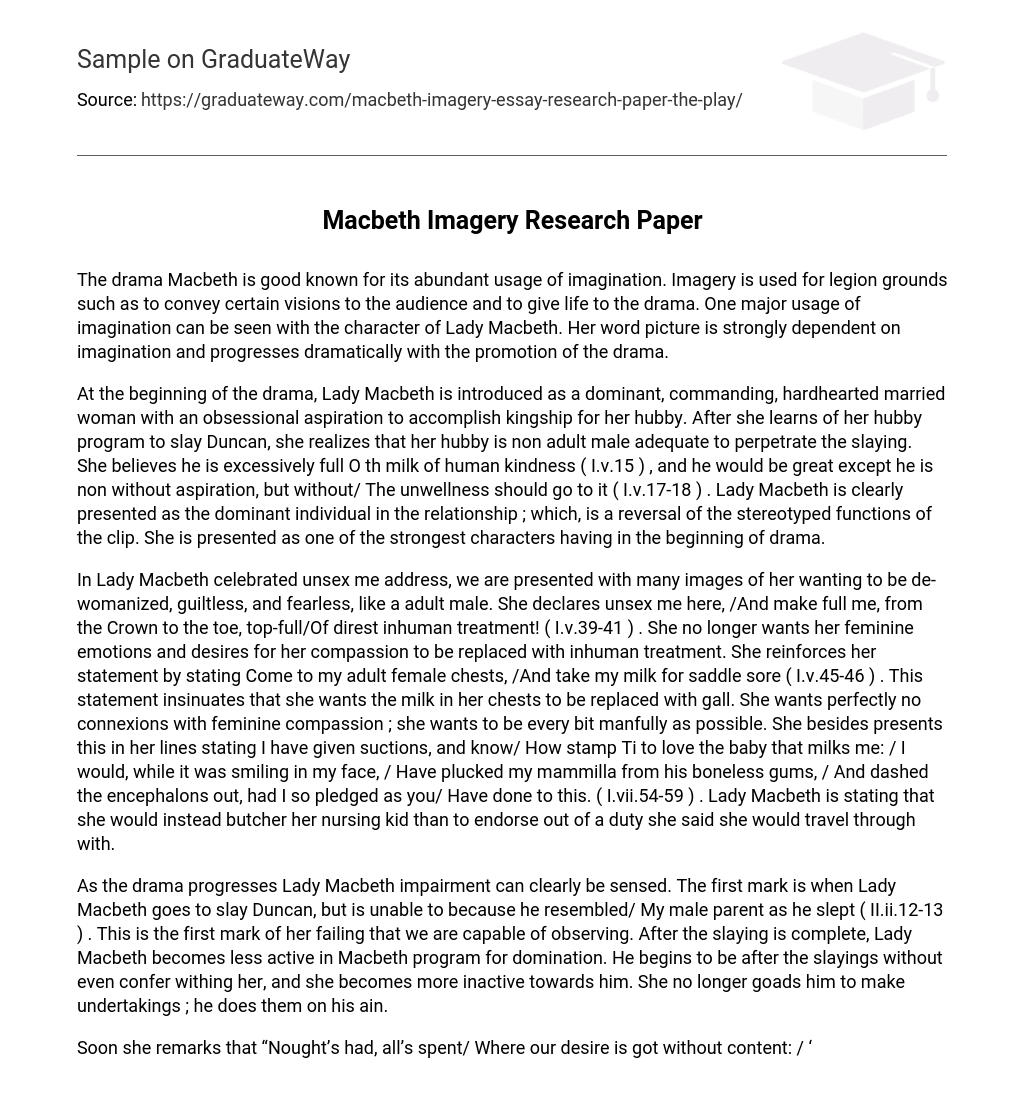The drama Macbeth is good known for its abundant usage of imagination. Imagery is used for legion grounds such as to convey certain visions to the audience and to give life to the drama. One major usage of imagination can be seen with the character of Lady Macbeth. Her word picture is strongly dependent on imagination and progresses dramatically with the promotion of the drama.
At the beginning of the drama, Lady Macbeth is introduced as a dominant, commanding, hardhearted married woman with an obsessional aspiration to accomplish kingship for her hubby. After she learns of her hubby program to slay Duncan, she realizes that her hubby is non adult male adequate to perpetrate the slaying. She believes he is excessively full O th milk of human kindness ( I.v.15 ) , and he would be great except he is non without aspiration, but without/ The unwellness should go to it ( I.v.17-18 ) . Lady Macbeth is clearly presented as the dominant individual in the relationship ; which, is a reversal of the stereotyped functions of the clip. She is presented as one of the strongest characters having in the beginning of drama.
In Lady Macbeth celebrated unsex me address, we are presented with many images of her wanting to be de-womanized, guiltless, and fearless, like a adult male. She declares unsex me here, /And make full me, from the Crown to the toe, top-full/Of direst inhuman treatment! ( I.v.39-41 ) . She no longer wants her feminine emotions and desires for her compassion to be replaced with inhuman treatment. She reinforces her statement by stating Come to my adult female chests, /And take my milk for saddle sore ( I.v.45-46 ) . This statement insinuates that she wants the milk in her chests to be replaced with gall. She wants perfectly no connexions with feminine compassion ; she wants to be every bit manfully as possible. She besides presents this in her lines stating I have given suctions, and know/ How stamp Ti to love the baby that milks me: / I would, while it was smiling in my face, / Have plucked my mammilla from his boneless gums, / And dashed the encephalons out, had I so pledged as you/ Have done to this. ( I.vii.54-59 ) . Lady Macbeth is stating that she would instead butcher her nursing kid than to endorse out of a duty she said she would travel through with.
As the drama progresses Lady Macbeth impairment can clearly be sensed. The first mark is when Lady Macbeth goes to slay Duncan, but is unable to because he resembled/ My male parent as he slept ( II.ii.12-13 ) . This is the first mark of her failing that we are capable of observing. After the slaying is complete, Lady Macbeth becomes less active in Macbeth program for domination. He begins to be after the slayings without even confer withing her, and she becomes more inactive towards him. She no longer goads him to make undertakings ; he does them on his ain.
Soon she remarks that “Nought’s had, all’s spent/ Where our desire is got without content: / ‘Tis safer to be that which we destroy/ Than by devastation dwell in dubious joy” ( III.ii.4-7 ) . We now see Lady Macbeth is repenting her determination to victimize Macbeth into slaying Duncan. She is non able to bask their new success because she is unable to be certain they were truly successful. This guilt and repent she is experiencing is precisely what she was seeking to forestall.
Towards the terminal, we notice that Lady Macbeth is somnambulating, and she is afflicted with hallucinations of guilt as a consequence of all the slayings. She walks around the palace with a taper and rubs her custodies as if she were rinsing them. For a minute she stops and says, What, will these custodies ne er be clean ( V.i.38 ) . She continues on by stating Here the odor of blood still. All the per-/fumes of Arabia will non dulcify this small manus ( V.i.43-44 ) . She is haunting over seeking to go wholesome once more. She feels that she must cleanse herself of these wickednesss. The darkness has stripped her of her mask of strength, and she is now engulfed in torment and sorrow. She has become incapacitated. The idea of the immorality, which she one time sought after and accepted, is now an image of panic in her head.
The physician says to the dame Look after her ; / Remove from her the agency of all irritation, / And still maintain eyes upon her. ( V.i.66-68 ) . The physician is warning that Lady Macbeth must be observed carefully because she may perpetrate self-destruction. Lady Macbeth continues to populate in her confused province, and finally she takes her on life. One of the strongest characters of the beginning of the drama brings about her ain devastation that leads to her decease.
In drumhead, Lady Macbeth character bit by bit disintegrates through a false portraiture of dogged strength, an unsteady control of her hubby, and switching engagement with supernatural powers. Lady Macbeth impairment is non merely a consequence of her unwise determinations and actions ; many factors played a function in this calamity of this character morale. She regarded supernatural forces with such regard and assurance, she tried to acquire in touch with her ain merely to go overpowered by their evilness. Her desire for an daunting personality resulted in the devastation of her ethical motives and in the terminal, the barbarous realisation of her true failings. The twosome aspirations, although obsessional, are a characteristic of human nature. Her gift of rough control over Macbeth resulted in a parlous journey for a common end and the death of non merely herself but besides her hubby. Possibly as a consequence of these many factors, Lady Macbeth ends her life and Macbeth is forced to chew over his ain being every bit good.





